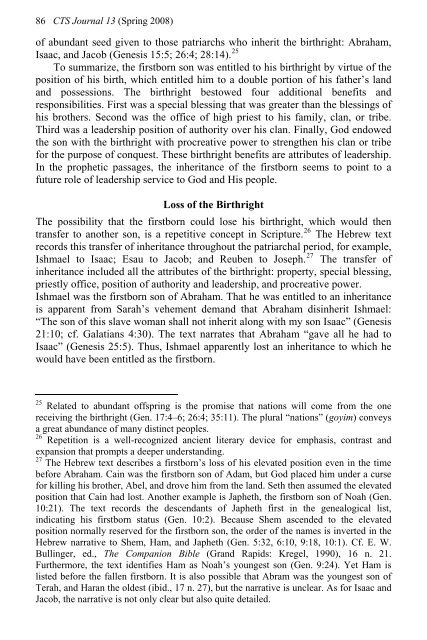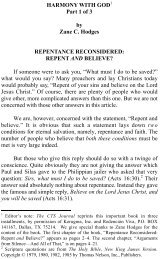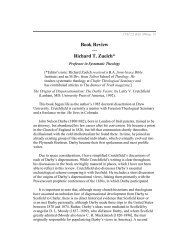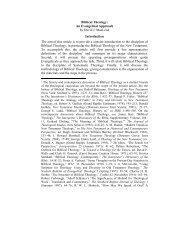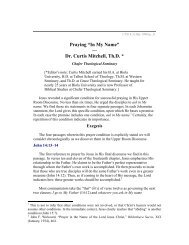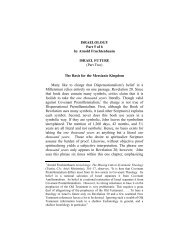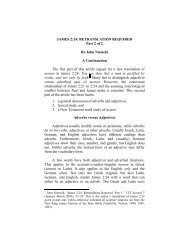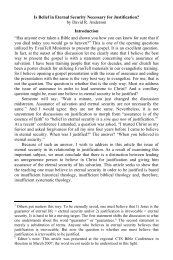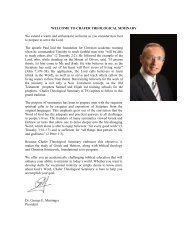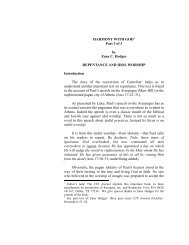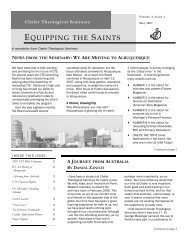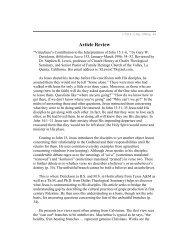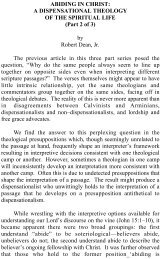Israel's Inheritance: Birthright of the Firstborn Son - Chafer ...
Israel's Inheritance: Birthright of the Firstborn Son - Chafer ...
Israel's Inheritance: Birthright of the Firstborn Son - Chafer ...
Create successful ePaper yourself
Turn your PDF publications into a flip-book with our unique Google optimized e-Paper software.
86 CTS Journal 13 (Spring 2008)<br />
<strong>of</strong> abundant seed given to those patriarchs who inherit <strong>the</strong> birthright: Abraham,<br />
Isaac, and Jacob (Genesis 15:5; 26:4; 28:14). 25<br />
To summarize, <strong>the</strong> firstborn son was entitled to his birthright by virtue <strong>of</strong> <strong>the</strong><br />
position <strong>of</strong> his birth, which entitled him to a double portion <strong>of</strong> his fa<strong>the</strong>r’s land<br />
and possessions. The birthright bestowed four additional benefits and<br />
responsibilities. First was a special blessing that was greater than <strong>the</strong> blessings <strong>of</strong><br />
his bro<strong>the</strong>rs. Second was <strong>the</strong> <strong>of</strong>fice <strong>of</strong> high priest to his family, clan, or tribe.<br />
Third was a leadership position <strong>of</strong> authority over his clan. Finally, God endowed<br />
<strong>the</strong> son with <strong>the</strong> birthright with procreative power to streng<strong>the</strong>n his clan or tribe<br />
for <strong>the</strong> purpose <strong>of</strong> conquest. These birthright benefits are attributes <strong>of</strong> leadership.<br />
In <strong>the</strong> prophetic passages, <strong>the</strong> inheritance <strong>of</strong> <strong>the</strong> firstborn seems to point to a<br />
future role <strong>of</strong> leadership service to God and His people.<br />
Loss <strong>of</strong> <strong>the</strong> <strong>Birthright</strong><br />
The possibility that <strong>the</strong> firstborn could lose his birthright, which would <strong>the</strong>n<br />
transfer to ano<strong>the</strong>r son, is a repetitive concept in Scripture. 26 The Hebrew text<br />
records this transfer <strong>of</strong> inheritance throughout <strong>the</strong> patriarchal period, for example,<br />
Ishmael to Isaac; Esau to Jacob; and Reuben to Joseph. 27 The transfer <strong>of</strong><br />
inheritance included all <strong>the</strong> attributes <strong>of</strong> <strong>the</strong> birthright: property, special blessing,<br />
priestly <strong>of</strong>fice, position <strong>of</strong> authority and leadership, and procreative power.<br />
Ishmael was <strong>the</strong> firstborn son <strong>of</strong> Abraham. That he was entitled to an inheritance<br />
is apparent from Sarah’s vehement demand that Abraham disinherit Ishmael:<br />
“The son <strong>of</strong> this slave woman shall not inherit along with my son Isaac” (Genesis<br />
21:10; cf. Galatians 4:30). The text narrates that Abraham “gave all he had to<br />
Isaac” (Genesis 25:5). Thus, Ishmael apparently lost an inheritance to which he<br />
would have been entitled as <strong>the</strong> firstborn.<br />
25 Related to abundant <strong>of</strong>fspring is <strong>the</strong> promise that nations will come from <strong>the</strong> one<br />
receiving <strong>the</strong> birthright (Gen. 17:4–6; 26:4; 35:11). The plural “nations” (goyim) conveys<br />
a great abundance <strong>of</strong> many distinct peoples.<br />
26 Repetition is a well-recognized ancient literary device for emphasis, contrast and<br />
expansion that prompts a deeper understanding.<br />
27 The Hebrew text describes a firstborn’s loss <strong>of</strong> his elevated position even in <strong>the</strong> time<br />
before Abraham. Cain was <strong>the</strong> firstborn son <strong>of</strong> Adam, but God placed him under a curse<br />
for killing his bro<strong>the</strong>r, Abel, and drove him from <strong>the</strong> land. Seth <strong>the</strong>n assumed <strong>the</strong> elevated<br />
position that Cain had lost. Ano<strong>the</strong>r example is Japheth, <strong>the</strong> firstborn son <strong>of</strong> Noah (Gen.<br />
10:21). The text records <strong>the</strong> descendants <strong>of</strong> Japheth first in <strong>the</strong> genealogical list,<br />
indicating his firstborn status (Gen. 10:2). Because Shem ascended to <strong>the</strong> elevated<br />
position normally reserved for <strong>the</strong> firstborn son, <strong>the</strong> order <strong>of</strong> <strong>the</strong> names is inverted in <strong>the</strong><br />
Hebrew narrative to Shem, Ham, and Japheth (Gen. 5:32, 6:10, 9:18, 10:1). Cf. E. W.<br />
Bullinger, ed., The Companion Bible (Grand Rapids: Kregel, 1990), 16 n. 21.<br />
Fur<strong>the</strong>rmore, <strong>the</strong> text identifies Ham as Noah’s youngest son (Gen. 9:24). Yet Ham is<br />
listed before <strong>the</strong> fallen firstborn. It is also possible that Abram was <strong>the</strong> youngest son <strong>of</strong><br />
Terah, and Haran <strong>the</strong> oldest (ibid., 17 n. 27), but <strong>the</strong> narrative is unclear. As for Isaac and<br />
Jacob, <strong>the</strong> narrative is not only clear but also quite detailed.


